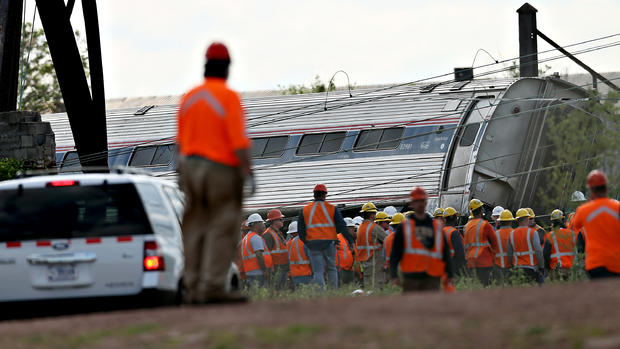NTSB's "long battle" to keep U.S. travelers safe
NTSB are the initials you hear most often after a disaster on the road, rails or in the skies.
"We are the investigators," NTSB Chairman Christopher Hart told CBS News travel editor Peter Greenberg. "We go to the transportation accident scenes to figure out what went wrong and then make recommendations to try to prevent it from happening again."
Some of the agency's recommendations have led to safer air bags in cars, anti-lock brakes on trucks and ground warning systems on planes.
"Our big-picture success story is that more than 80 percent of the time, even though we can require it, people do it. That's a success story for me, and that's a tribute to the quality of the staff we have that investigate and analyze the investigation to come up with recommendations," Hart said.
But many of the NTSB's most urgent recommendations to federal agencies and the industries they are supposed to regulate get little attention. So, to create public awareness, the NTSB started a "Most Wanted List" 25 years ago.
Surprisingly, there are items from 1990 that are still on the list.
"Positive train control is a good example of that," Hart said.
Eight people were killed in May when a speeding Amtrak train crashed in Philadelphia. Eighteen months earlier, four people died when a New York City regional commuter train also crashed at high speed.
Positive train control, an available technology to ensure safe speed, could have prevented both accidents.
"That's one of the few items on our Most Wanted List that actually has a date, because Congress established the date; the end of 2015," Hart said.
They were allotted seven years for the project, but Greenberg says it's something they could have solved seven years ago.
"It's been a long battle," Hart said.
That battle may continue because it's unlikely all of the nation's trains will meet the December deadline.
Another NTSB recommendation that has remained largely ignored would require seat restraints on planes for children under two years of age, who can now legally sit on a parent's lap during takeoff and landings.
"Flight attendants have been penalized, either suspended or fined by the FAA, for not securing a coffee pot, but yet we can fly the airplane with a child unsecured. It's just beyond common sense," former NTSB investigator John Goglia said.
The NTSB first made the recommendation in 1979. Then in 1989, United flight 232 crash landed in Sioux City, Iowa. More than half of the 296 people on board survived. But during its investigation, the NTSB discovered that an unrestrained lap child did not.
"We have oceans of data that show a parent or anybody cannot hold a child in any of these events," Goglia said.
The FAA conducted their own crash tests and came to the same conclusion as the NTSB.
"The physics is very simple. If you're unrestrained, you're going to be a potential missile in a crash," Hart said.
But the FAA ruled that requiring child restraint systems would "significantly raise the price for those families," and that this would "divert some family travel from the air transportation system to the highway system." That, the FAA deemed, would subject those families to "far higher fatality rates."
"I don't know where that was thought up, but there is nothing behind it. It's not a peered review," Goglia said. "It's blue smoke and mirrors, which Washington is known for."
After nearly three decades of FAA inaction, the NTSB removed the child restraint recommendation from its Most Wanted List.
"The cost-benefit challenge is always there in anything that has to be done. That's the challenge," Hart said.
Even though the NTSB dropped child seat restraints from its list, it hasn't backed away from supporting it.
Another recommendation dropped from the list, amid frustration, was a federal mandate requiring motorcyclists to wear helmets.
For detailed descriptions of recommendations, read the NTSB's Most Wanted List here.
